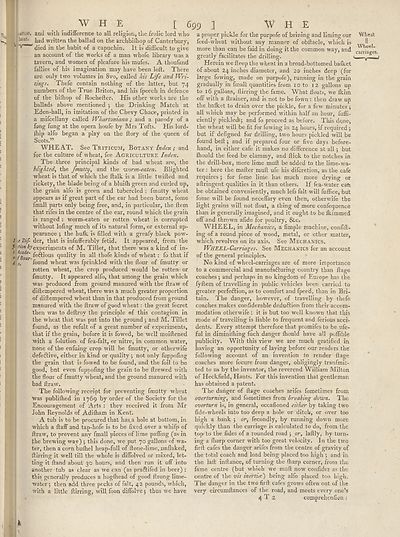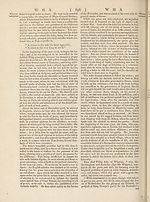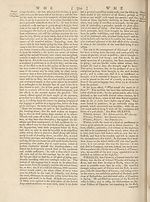Encyclopaedia Britannica, or, a Dictionary of arts, sciences, and miscellaneous literature : enlarged and improved. Illustrated with nearly six hundred engravings > Volume 20, SUI-ZYM
(831) Page 699 - WHE
Download files
Complete book:
Individual page:
Thumbnail gallery: Grid view | List view

w H E t 699 ] W H E
lahon, and with indifference to all religion, the frolic lord who
had written the ballad on the archbilhop of Canterbury,
^ 11 died in the habit of a capuchin. It is difficult to give
an account of the works of a man whofe library was a
tavern, and women of pleafure his mufes. A thoufand
fallies of his imagination may have been loft. There
are only two volumes in 8vo, called his Life and Wri¬
tings. Thefe contain nothing of the latter, but 74
numbers of the True Briton, and his fpeech in defence
of the biftiop of Rochefter. His other works are the
ballads above mentioned j the Drinking Match at
Eden-hall, in imitation of the Chevy Chace, printed in
a mifcellany called Whartoniana ; and a parody of a
fong fung at the opera houfe by Mrs Tofts. His lord-
ftiip alfo began a play on the ftory of the queen of
Scots.”
WHEAT. See Triticum, Botany/We*; and
for the culture of wheat, fee Agriculture Index.
The three principal kinds of bad wheat are, the
blighted, the fmutty, and the worm-eaten. Blighted
wheat is that of which the ftalk is a little twifted and
rickety, the blade being of a bluifti green and curled up,
the grain alfo is green and tubercled : fmutty wheat
appears as if great part of the ear had been burnt, fome
fmall parts only being free, and, in particular, the ftem
that rifes in the centre of the ear, round which the grain
is ranged : worm-eaten or rotten wheat is corrupted
without lofing much of its natural form, or external ap¬
pearance ; the hulk is filled with a greafy black pow-
1 ;f Lif- der, that is infufferably fetid. It appeared, from the
^ ^experiments of M. Tillet, that there was a kind of in-
v fggj* feftious quality in all thofe kinds of wheat : fo that if
i x, found wheat was fprinkled with the flour of fmutty or
rotten wheat, the crop produced would be rotten or
fmutty. It appeared alfo, that among the grain which
was produced from ground manured with the ftraw of
diftempered wheat, there was a much greater proportion
of diftempered wheat than in that produced from ground
manured with the ftraw of good wheat: the great fecret
then was to deftroy the principle ef this contagion in
the wheat that was put into the ground j and M. Tillet
found, as the refult of a great number of experiments,
that if the grain, before it is fowed, be well moiftened
with a folution of fea-falt, or nitre, in common water,
none of the enfuing crop will be fmutty, or otherwife
,defe6Iive, either in kind or quality ; not only fuppofing
the grain that is fowed to be found, and the foil to be
good, bnt even fuppofing the grain to be ftrewed with
the flour of fmutty wheat, and the ground manured with
bad ftraw.
The following receipt for preventing fmutty wheat
was publifhed in 1769 by order of the Society for the
Encouragement of Arts : they received it from Mr
John Reynolds of Adifham in Kent.
A tub is to be procured that has a hole at bottom, in
which a ftaff and tap-hofe is to be fixed over a whifp of
ftraw, to prevent any fmall pieces of lime paffing (as in
the brewing way) ; this done, we put 70 gallons of wa¬
ter, then a corn bufliel heap-full of ftone-lime, unflaked,
ftirring it well till the whole is diffolved or mixed, let¬
ting it ftand about 30 hours, and then run it off into
another tub as clear as we can (as praftifed in beer) :
this generally produces a hogfhead of good ftrong lime-
water-, then add three pecks of fait, 42 pounds, which,
with a little ftirring, will foon diffolve 5 thus we have
i
a proper pickle for the purpofe of brining and liming our Wheat
feed-wheat without any manner of obftacle, which is ^
more than can be faid in doing it the common way, and carriat^
greatly facilitates the drilling. ■ “ „
Herein we fteep the wheat in a broad-bottomed bafket
of about 24 inches diameter, and 20 inches deep (for
large fowing, made on purpofe), running in the grain
gradually in fmall quantities from 10 to 12 gallons up
to 16 gallons, ftirring the fame. What floats, we fkirn
oft with a ftrainer, and is not to be fown : then draw up
the bafket to drain over the pickle, for a few minutes ;
all which may be performed within half an hour, fuffi-
ciently pickledlj and fo proceed as before. This done-,
the wheat will be fit for fowing in 24 hours, if required ;
but if defigned for drilling, two hours pickled will be
found beft j and if prepared four or five days before¬
hand, in either cafe it makes no difference at all -, but
fhould the feed be clammy, and flick to the notches in
the drill-box, more lime muft be added to the lime-wa¬
ter : here the mailer muft ufe his diferetion, as the cafe
requires; for fome lime has much more drying or
aftringent qualities in it than others. If fea-water cah
be obtained conveniently, much lefs fait will fuffice, but
fome will be found neceffary even then, othervvife the
light grains will not float, a thing of more confequence
than is generally imagined, and it ought to be fkimmed
off and thrown afide for poultry, &c.
WHEEL, in Mechanics, a Ample machine, confift-
ing of a round piece of wood, metal, or other matter,
which revolves on its axis. See Mechanics.
WHEEL-Carrtages. See Mechanics for an account
of the general principles.
No kind of wheel-carriages are of more importance
to a commercial and manufafluring country than ftage
coaches j and perhaps in no kingdom of Euiope has the
fyllem of travelling in public vehicles been carried to
greater perfeflion, as to comfort and fpeed, than in Bri¬
tain. The danger, however, of travelling by thefe
coaches makes confiderable deduction from their accom¬
modation otherwife : it is but too well known that this
mode of travelling is liable to frequent and ferious acci¬
dents. Every attempt therefore that promifes to be ufe-
ful in diminifhing fuch danger fhould have all poffible
publicity. With this view we are much gratified in
having an opportunity of laying before our readers the
following account of an invention to render ftage
coaches more fecure from danger, obligingly tranfmit-
ted to us by the inventor, the reverend William Milton
of Heckfield, Hants. For this invention that gentleman
has obtained a patent.
The danger of ftage coaches arifes fometimes from
overturning, and fometimes from breaking down. The
overturn is, in general, occafioned either by taking two
fide-wheels into too deep a hole or ditch, or over too
high a bank j or, fecondly, by running down more
quickly than the carriage is calculated to do, from the
top to the fides of a rounded road j or, laftly, by turn¬
ing a fharp corner with too great velocity. In the two
firft cafes the danger arifes from the centre of gravity of
the total coach and load being placed too high and in
the laft inftance, of turning the fharp corner, from the
fame centre (but which we muft now eonfider as the
centre of the vis inertice') being alfo placed too high.
The danger in the two firft cafes grows often out of the
very circumftances of the road, and meets every one’s
4T2 comprehenfion •:
lahon, and with indifference to all religion, the frolic lord who
had written the ballad on the archbilhop of Canterbury,
^ 11 died in the habit of a capuchin. It is difficult to give
an account of the works of a man whofe library was a
tavern, and women of pleafure his mufes. A thoufand
fallies of his imagination may have been loft. There
are only two volumes in 8vo, called his Life and Wri¬
tings. Thefe contain nothing of the latter, but 74
numbers of the True Briton, and his fpeech in defence
of the biftiop of Rochefter. His other works are the
ballads above mentioned j the Drinking Match at
Eden-hall, in imitation of the Chevy Chace, printed in
a mifcellany called Whartoniana ; and a parody of a
fong fung at the opera houfe by Mrs Tofts. His lord-
ftiip alfo began a play on the ftory of the queen of
Scots.”
WHEAT. See Triticum, Botany/We*; and
for the culture of wheat, fee Agriculture Index.
The three principal kinds of bad wheat are, the
blighted, the fmutty, and the worm-eaten. Blighted
wheat is that of which the ftalk is a little twifted and
rickety, the blade being of a bluifti green and curled up,
the grain alfo is green and tubercled : fmutty wheat
appears as if great part of the ear had been burnt, fome
fmall parts only being free, and, in particular, the ftem
that rifes in the centre of the ear, round which the grain
is ranged : worm-eaten or rotten wheat is corrupted
without lofing much of its natural form, or external ap¬
pearance ; the hulk is filled with a greafy black pow-
1 ;f Lif- der, that is infufferably fetid. It appeared, from the
^ ^experiments of M. Tillet, that there was a kind of in-
v fggj* feftious quality in all thofe kinds of wheat : fo that if
i x, found wheat was fprinkled with the flour of fmutty or
rotten wheat, the crop produced would be rotten or
fmutty. It appeared alfo, that among the grain which
was produced from ground manured with the ftraw of
diftempered wheat, there was a much greater proportion
of diftempered wheat than in that produced from ground
manured with the ftraw of good wheat: the great fecret
then was to deftroy the principle ef this contagion in
the wheat that was put into the ground j and M. Tillet
found, as the refult of a great number of experiments,
that if the grain, before it is fowed, be well moiftened
with a folution of fea-falt, or nitre, in common water,
none of the enfuing crop will be fmutty, or otherwife
,defe6Iive, either in kind or quality ; not only fuppofing
the grain that is fowed to be found, and the foil to be
good, bnt even fuppofing the grain to be ftrewed with
the flour of fmutty wheat, and the ground manured with
bad ftraw.
The following receipt for preventing fmutty wheat
was publifhed in 1769 by order of the Society for the
Encouragement of Arts : they received it from Mr
John Reynolds of Adifham in Kent.
A tub is to be procured that has a hole at bottom, in
which a ftaff and tap-hofe is to be fixed over a whifp of
ftraw, to prevent any fmall pieces of lime paffing (as in
the brewing way) ; this done, we put 70 gallons of wa¬
ter, then a corn bufliel heap-full of ftone-lime, unflaked,
ftirring it well till the whole is diffolved or mixed, let¬
ting it ftand about 30 hours, and then run it off into
another tub as clear as we can (as praftifed in beer) :
this generally produces a hogfhead of good ftrong lime-
water-, then add three pecks of fait, 42 pounds, which,
with a little ftirring, will foon diffolve 5 thus we have
i
a proper pickle for the purpofe of brining and liming our Wheat
feed-wheat without any manner of obftacle, which is ^
more than can be faid in doing it the common way, and carriat^
greatly facilitates the drilling. ■ “ „
Herein we fteep the wheat in a broad-bottomed bafket
of about 24 inches diameter, and 20 inches deep (for
large fowing, made on purpofe), running in the grain
gradually in fmall quantities from 10 to 12 gallons up
to 16 gallons, ftirring the fame. What floats, we fkirn
oft with a ftrainer, and is not to be fown : then draw up
the bafket to drain over the pickle, for a few minutes ;
all which may be performed within half an hour, fuffi-
ciently pickledlj and fo proceed as before. This done-,
the wheat will be fit for fowing in 24 hours, if required ;
but if defigned for drilling, two hours pickled will be
found beft j and if prepared four or five days before¬
hand, in either cafe it makes no difference at all -, but
fhould the feed be clammy, and flick to the notches in
the drill-box, more lime muft be added to the lime-wa¬
ter : here the mailer muft ufe his diferetion, as the cafe
requires; for fome lime has much more drying or
aftringent qualities in it than others. If fea-water cah
be obtained conveniently, much lefs fait will fuffice, but
fome will be found neceffary even then, othervvife the
light grains will not float, a thing of more confequence
than is generally imagined, and it ought to be fkimmed
off and thrown afide for poultry, &c.
WHEEL, in Mechanics, a Ample machine, confift-
ing of a round piece of wood, metal, or other matter,
which revolves on its axis. See Mechanics.
WHEEL-Carrtages. See Mechanics for an account
of the general principles.
No kind of wheel-carriages are of more importance
to a commercial and manufafluring country than ftage
coaches j and perhaps in no kingdom of Euiope has the
fyllem of travelling in public vehicles been carried to
greater perfeflion, as to comfort and fpeed, than in Bri¬
tain. The danger, however, of travelling by thefe
coaches makes confiderable deduction from their accom¬
modation otherwife : it is but too well known that this
mode of travelling is liable to frequent and ferious acci¬
dents. Every attempt therefore that promifes to be ufe-
ful in diminifhing fuch danger fhould have all poffible
publicity. With this view we are much gratified in
having an opportunity of laying before our readers the
following account of an invention to render ftage
coaches more fecure from danger, obligingly tranfmit-
ted to us by the inventor, the reverend William Milton
of Heckfield, Hants. For this invention that gentleman
has obtained a patent.
The danger of ftage coaches arifes fometimes from
overturning, and fometimes from breaking down. The
overturn is, in general, occafioned either by taking two
fide-wheels into too deep a hole or ditch, or over too
high a bank j or, fecondly, by running down more
quickly than the carriage is calculated to do, from the
top to the fides of a rounded road j or, laftly, by turn¬
ing a fharp corner with too great velocity. In the two
firft cafes the danger arifes from the centre of gravity of
the total coach and load being placed too high and in
the laft inftance, of turning the fharp corner, from the
fame centre (but which we muft now eonfider as the
centre of the vis inertice') being alfo placed too high.
The danger in the two firft cafes grows often out of the
very circumftances of the road, and meets every one’s
4T2 comprehenfion •:
Set display mode to:
![]() Universal Viewer |
Universal Viewer | ![]() Mirador |
Large image | Transcription
Mirador |
Large image | Transcription
Images and transcriptions on this page, including medium image downloads, may be used under the Creative Commons Attribution 4.0 International Licence unless otherwise stated. ![]()
| Permanent URL | https://digital.nls.uk/192285350 |
|---|
| Description | Plates 516, 519 and 520 missing. |
|---|---|
| Attribution and copyright: |
|
| Description | Ten editions of 'Encyclopaedia Britannica', issued from 1768-1903, in 231 volumes. Originally issued in 100 weekly parts (3 volumes) between 1768 and 1771 by publishers: Colin Macfarquhar and Andrew Bell (Edinburgh); editor: William Smellie: engraver: Andrew Bell. Expanded editions in the 19th century featured more volumes and contributions from leading experts in their fields. Managed and published in Edinburgh up to the 9th edition (25 volumes, from 1875-1889); the 10th edition (1902-1903) re-issued the 9th edition, with 11 supplementary volumes. |
|---|---|
| Additional NLS resources: |
|

